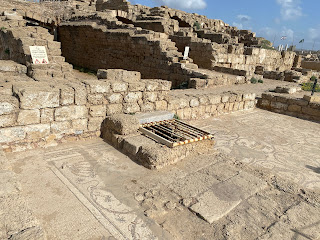Day 11 – Light to the Nations
This was to be our last day in Israel, and we would have started our morning by reflecting on Psalm 133, which opens with, “Behold, how good and pleasant it is when brothers dwell in unity!” (Ps. 133:1). At this point in our trip, our team would be like family, having experienced so much of the biblical story in the Land together. And yet, as we reflect on this passage in the midst of what is happening in Israel today, our hearts should long for peace and unity.
David ponders on the goodness and joy of living in a united nation at peace with his fellow countrymen. Unity among brothers is a rare and precious experience. He references the oils poured over the head and beard of Aaron as he was anointed High Priest unto the Lord (Lev. 8:1-12). The anointing of a High Priest was a joyous occasion that did not happen often. And the dew of Mount Hermon that provided lifegiving water for the Land.
Today, the Land is in turmoil as horrific events and actions are bringing devastation to the people. Pray for peace for Israel. Pray for a time of healing and refreshment. Pray for unity and hope. May we be a people that brings unity, hope, and peace to those around us, that we can be a light to the nations.
Mount Carmel – 1 Kings 18:1-46

Overlooking the Jezreel Valley
God sent his prophet Elijah to challenge Ahab and the false prophets. It is from this place that we hear Elijah call out, “How long will you go limping between two different opinions? If the LORD is God, follow him; but if Baal, then follow him” (1 Kings 18:21). You know the story of God’s demonstration before the people and the victory over the pagan priests. In this place, God demonstrated his power over the gods of the nations. Standing on top of this Mount, one can see the entire nation of Israel. Overlooking the Jezreel Valley and peering to the south, you cannot see Beersheba (where we started our journey). After Elijah’s victory, he ran south, not declaring God’s victory, but in fear of Jezebel’s revenge.
 |
| Statue of Elijah’s Victory |
 |
| Byzantine Church on Mount Carmel |
The Mount Carmel experience should have emboldened the believers in God to take his message to the nations. Unfortunately, Elijah’s focus shifted from God’s victory to his own frailty. Do not be hard on Elijah, for you and I struggle in the same way. How easily we can forget the amazing grace and mercy of our God and retreat in fear in the face of adversity. Although Elijah ran away that day, the story of God’s victory on Mount Carmel still rings true, that he alone is the one true God, in Israel and over the nations of the world. Let us pray for the day that the nations of the world declare “The LORD, he is God; the LORD, he is God” (1 Kings 18:39).
 |
| Looking South from the Top of Mount Carmel with arrows pointing to the different cities |
Caesarea Maritima – Acts 18:21-23
Descending Mount Carmel, we will head to the Mediterranean coast and visit Caesarea Maritima, a port city that Herod the Great built. The ruins of Caesarea are a magnificent testimony to the harbor city’s glory. Walking through the National Park, we walk where so many biblical stories took place and learn how this port became a launch pad for the Gospel to go to all the nations in fulfillment of Christ’s words (Acts 1:8).
 |
| Caesarea Maritima National Park |
After Paul’s conversion, he left this port for Tarsus (Acts 9:30). It was here that Cornelius became the first Gentile to receive the Holy Spirit (Acts 10:1-8) opening the doors for other Gentile believers (Acts 10:44-48). Caesarea was the home of Philip the Evangelist (Acts 21:8). The Apostle Paul sailed from here on his missionary journeys (Acts 21:7-8), stood trial (Acts 23:33-35), was imprisoned (Acts 24:23), and was sent to Rome to stand trial (Acts 25:8,11).
 |
| Prison at Caesarea |
 |
| Amphitheater |
In our key text, Acts 18:21-23, we see one of those missionary journeys where Paul took the light of the Gospel of Christ to the nations of the world. Walking on the streets of Caesarea, we walk along the paths of the first missionaries. Pause for a moment and consider how blessed we are today that these faithful believers were willing to give up their lives, their comforts, and their freedom so that you and I could know the Good News of Jesus Christ!
 |
| Arena for Chariot Races |
Jaffa/Joppa – Jonah 1:1-3; Acts 11:1-9, 11:17-18
Departing Caesarea Maritima, we will head south to Joppa, the ancient port city where the cedars of Lebanon arrived for Solomon’s Temple (2 Chron. 2:16). Joppa was the home of Dorcas (Acts 9:6-43) and Simon the Tanner (Acts 10:5), whose house the Apostle Peter was staying when he received the vision to take the Gospel to the Gentiles (Acts 10:9-15).
Perhaps the most famous story from Joppa is of the prophet Jonah, for it was from Joppa that Jonah ran away from the “presence of the LORD” (Jonah 1:3). Sunday School and Veggie Tales version of Jonah often miss the point of this story. Why would Jonah want to run away from God’s mission to take the Gospel to Nineveh?
Jonah lived in a time when people thought of gods as local deities, over cities and nations. Jonah, although a prophet of God, had allowed the cultural understanding of localized gods to influence his perception of the One true God. He thought he could run away from the presence of God, but learned quickly that God is the King of the Universe, the God of gods, and the Lord of lords. Jonah’s encounter with the big fish was God’s demonstration that he could not run away. Perhaps it was this story that David was thinking about when he wrote Psalm 139:7–12:
7 Where shall I go from your Spirit? Or where shall I flee from your presence?
8 If I ascend to heaven, you are there! If I make my bed in Sheol, you are there!
9 If I take the wings of the morning and dwell in the uttermost parts of the sea,
10 even there your hand shall lead me, and your right hand shall hold me.
11 If I say, “Surely the darkness shall cover me, and the light about me be night,”
12 even the darkness is not dark to you; the night is bright as the day, for darkness is as light with you.(ESV)
But why did Jonah want to run away from God? God was calling Jonah to take the Light to the Nation of Nineveh. Jonah did not want to take the Good News of God to the people of Nineveh because he knew that God would save them (Jonah 4:2). He would rather run away and die in the sea than deliver a message to the Ninevites. This may seem harsh of Jonah, but we must understand that the Assyrian people were a brutal people. They had treated the Jewish people in despicable ways. Having seen his people, his family, mistreated and killed by the wicked people of Nineveh, Jonah wanted them to perish.
God, on the other hand, is full of grace and mercy. He desired Jonah to take his message to the people of Nineveh because there were 120,000 people whom God cared about (Jonah 4:11). It can be hard to separate our experiences from our mission to go into all the world (Matt. 28:18-20).
Jaffa/Joppa – Acts 11:1-9, 11:17-18
God challenged Jonah’s perspective at Joppa, and he chose Joppa to be the place to challenge Peter’s view of the Gentiles. Having experienced his vision in Joppa, Peter traveled throughout Judea sharing God’s message with Jewish believers. Salvation has come to the Jews and to the Gentiles. The Gospel of Jesus Christ is a message intended for the whole world. Peter’s lesson from Joppa led the early Church to embrace this saying, “Then to the Gentiles also God has granted repentance that leads to life” (Acts 11:18).
It is this message that we continue to preach to both Jews and Gentiles throughout the world. God created us to be in a relationship with Him. However, Sin separates us from God and cannot be worked off by good deeds. Therefore, God sent his Son, Jesus Christ, into the world to pay the price of sin by dying and raising from the dead. Everyone who believes in Jesus alone will have forgiveness and eternal life. This life is a life with Jesus that starts now and lasts forever. This means that this message changes us, changes our hearts, our actions, and our mission.
This 11th day of the trip ends where the Church missionary movements began. As we head to Ben Gurion Airport to head home, may we take with us the memories and the message that Jesus Christ came to save the world, and has called us to be a light to the nations.
Reflection Questions:
1. Reflect on the idea of unity and peace mentioned in Psalm 133. How does the concept of unity among believers impact your understanding of the church and its role in the world today?
2. In the story of Mount Carmel, we see the contrast between the darkness embraced by King Ahab and the faithful obedience to God's calling demonstrated by Elijah. How can this story inspire us to fulfill our calling and be a light to the nations in our own lives?
3. Acts 18:21-23 describes one of Paul's missionary journeys, which took the light of the Gospel to different nations. What might it mean for you to carry the light of Christ into your school, job, community, or even beyond?
4. Jonah initially tried to run away from God's mission to take the Good News to Nineveh. What do you think influenced Jonah's perspective, and how can we relate to his initial reluctance? How can we overcome our own hesitations in sharing the message of Jesus with others?
5. Reflect on the transformation that occurred in Joppa, where Peter's vision led to a change in his perspective regarding the Gentiles. How does this story emphasize the universality of the Gospel message? In what ways can we be part of sharing this message with people from different backgrounds and cultures?
Prayer:
Dear Heavenly Father,
As we reflect on our journey through this Israel trip devotional, we thank you for the many insights into the biblical story we have gained together. Lord, we also recognize the turmoil and unrest in Israel today, and our hearts ache for peace and unity in this land. We lift up our prayers for the people of Israel, asking for healing and refreshment. May your peace, which surpasses all understanding, prevail in this region. As we leave this holy land, may we take with us the memories and the message that Jesus Christ came to save the world. We are called to be a light to the nations, to share your love, grace, and mercy with everyone we meet.
In Jesus' name, we pray. Amen.

Comments
Post a Comment